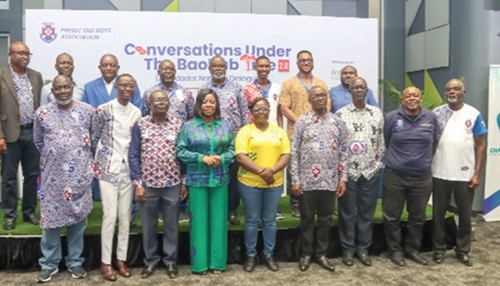The 2018 National Best Farmer, James Boateng, has called for a complete rethink and restructuring of the country’s agricultural sector, warning that fragmented policies, poor implementation and political interference continue to derail the sector’s potential to drive economic growth and ensure national food security.
He said about a million Ghanaians were not food secure, while millions of children under five were said to be malnourished.
Quoting World Food Programme statistics, he painted a stark picture of the country’s agricultural realities, describing them as unsustainable and disjointed.
Delivering the keynote address at the “Legon PRESEC Conversation Under the Baobab Tree” on the theme: “Towards a Holistic Approach to Agriculture in Ghana”, Mr Boateng blamed the situation on erratic weather patterns, high inflation, weak policy execution, and a disconnect between agricultural planning and ground-level realities.
“There is often a big gap between policy formulation and implementation. Policies change with every government, which creates uncertainty and disrupts progress,” the former National Best Farmer lamented.
The event
The event, held in Accra last Thursday, is an annual dialogue initiative organised by the past students' association of Presbyterian Boys’ Secondary School (PRESEC-Legon).
It brought together past students of the school, experts, policymakers and the public under the symbolic ɔdadeɛ (baobab) tree, a revered emblem of wisdom and resilience at PRESEC’s original Krobo Odumase campus.
Inefficiencies
Mr Boateng revealed that although the country earned about $27 billion annually from exports, agriculture contributed a mere $3 billion to this figure, even with cocoa included.
In contrast, he said, neighbouring Côte d’Ivoire raked in about $8 billion yearly from agriculture, with cocoa alone bringing in $6 billion.
“Côte d’Ivoire exports a billion dollars worth of mangoes every year.
Ghana, on the other hand, makes only about $60 million,” he said, stressing that Ghana’s agricultural value chain was riddled with inefficiencies and missed opportunities.
“Even in cashew, Ghana earns less than $300,000 despite all the noise,” he said.
He bemoaned the decline in the youth’s interest in agriculture, partly due to a lack of success stories and the perception of farming as unprofitable.
“Young people don’t see agriculture as a viable career. Those who venture in are often discouraged by systemic failures,” he said.
The 2018 National Best Farmer also decried the drain of agricultural labour into galamsey, the local term for illegal mining, where the miners earned more than farmers could pay.
Agro-export
Mr Boateng identified over-regulation and bureaucracy as major obstacles to agro-export.
“To export a tonne of mangoes, you might need approval from six different offices.
It’s like we are deliberately making it difficult,” he said.
He was also critical of the government’s commitment to funding agriculture, citing Ghana’s failure to meet the African Union’s 2014 Malabo Declaration to allocate at least six per cent of national budgets to the sector.
“We’re doing less than one per cent. If we won’t fund agriculture properly, how can we expect results?” he asked.
Mr Boateng urged the country to move from rhetoric to action.
“We have the policies.
What we lack is a coordinated, long-term and well-funded approach. If we treat agriculture with the seriousness it deserves, we can transform our economy and feed our people,” he said.

